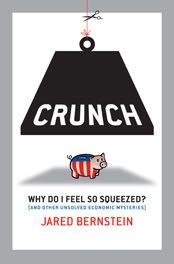Crunchtime In America: An Interview With Jared Bernstein
Crossposted from Intrepid Liberal Journal
 How many economists have you read or watched on television in recent years that claimed the economy was performing well while you struggled to make ends meat and keep up with the cost of living? Indeed, until recently a happy talk virus had infected a cabal of conservative plutocrats who preached the virtues of limited regulation, market forces and free trade as wages declined and predatory lenders had a party. It seemed we were hearing conservative politicians and their mouthpieces at the Heritage Foundation or Fox news refer to the economy as “the greatest story never told” at every opportunity.
How many economists have you read or watched on television in recent years that claimed the economy was performing well while you struggled to make ends meat and keep up with the cost of living? Indeed, until recently a happy talk virus had infected a cabal of conservative plutocrats who preached the virtues of limited regulation, market forces and free trade as wages declined and predatory lenders had a party. It seemed we were hearing conservative politicians and their mouthpieces at the Heritage Foundation or Fox news refer to the economy as “the greatest story never told” at every opportunity.
Now that the housing and credit crisis has metastasized, conservative apparatchiks are fighting to minimize government intervention on behalf of regular folks while preserving corporate welfare. They accuse anyone who raises a fuss of waging class warfare. Instead these agents of the status quo prefer we erroneously obsess about Social Security going bust and agree to privatize it for Wall Street's benefit.
Thankfully, renowned economist and the director of the Living Standards Program for the Economic Policy Institute, Jared Bernstein is using his megaphone to fight the madness. With his new book, Crunch: Why Do I Feel So Squeezed? (And Other Economic Mysteries), Bernstein responds to dozens of questions asked by working Americans that relate to the dollars and cents concerns of real people. Bernstein who often appears as a commentator on CNBC wrote in the preface of his book that,
“I’m tired of being stuck in the studio engaging in rants with Darth Vaders with PhDs. Wouldn’t it be more useful to have an open-ended, rant-free dialogue with real, everyday people about their economic questions.”With Crunch, Bernstein effectively validates the daily experience of working people struggling to keep up in a treadmill economy. He also adroitly writes with accessible prose and powerful anecdotes to both educate readers about economic nuances and empower them to influence politics in a more populist direction. Bernstein contends that the rich and powerful have as much influence on who benefits from the economy as the will of the market. He therefore hopes to inspire readers not to cede any more ground to the practitioners of hyper individualism at the expense of the American community.
One of the most memorable anecdotes in Bernstein’s book describes how Circuit City announced it planned to lay off 3,400 sales associates in the spring of 2007 in order to appease their shareholders. Bernstein utilized this anecdote to illustrate how corporate greed is both heartless and self-defeating:
“Talk about in-your face management. I can absolutely see why a firm whose stock was down by a third over the past year would decide to make some big changes. But unless your workforce is truly overpaid, replacing a big chunk of it with lower-paid workers is a recipe for lousier service, fewer sales, and lower profits. At the time, many predicted that after the initial jump, stock prices would sink further. We were wrong, though. They never got that initial bump, and the stock just kept sliding, down 15 percent a few months later (while the overall stock market was up strong).”It’s that kind of prose that led former North Carolina Senator and populist presidential candidate John Edwards to issue the following praise:
“Jared Bernstein’s new book is a must read for everyone who cares about restoring economic fairness in an America with the greatest income inequality since the Great Depression. Drawing on everyday examples, Crunch is an accessible explanation of economic principles presented with equal parts of insight, humor, and stimulation. In the process, Bernstein explains how we got to where we are, what to do to fix it, and why fighting for a fair society is so important.”An expert on issues of labor and income inequality, he frequently testifies on Capitol Hill. Bernstein is also the co-author of eight editions of The State of Working America and he posts frequently on Josh Marshall’s blog, TPM Café. Longtime readers/listeners of the Intrepid Liberal Journal may recall an interview he did for this blog after his book, All Together Now: Common Sense For A Fair Economy was published in 2006.
Bernstein agreed to a podcast interview over the telephone about his current book and the current challenges confronting the American economy. Our conversation was approximately forty-eight minutes and among the issues covered includes the housing and credit crisis, needed regulatory reform, healthcare, globalization, Social Security, America’s investment deficit and free trade. Please refer to the media player below.
This interview can also be accessed for free by searching for “Intrepid Liberal Journal” on Itunes.









